The Ukrainian Bar Association held the 1st Forum on Anti-Corruption Law
On Thursday, March 7, the Ukrainian Bar Association held the 1st Forum on Anti-Corruption Law in Kyiv. This is a new event in the UBA Conference house and the first major event of the Association in 2024.
The Forum has become a platform for exchange of views and active discussion with leading experts in the field of anti-corruption law, including judges, representatives of government agencies and experienced legal practitioners.
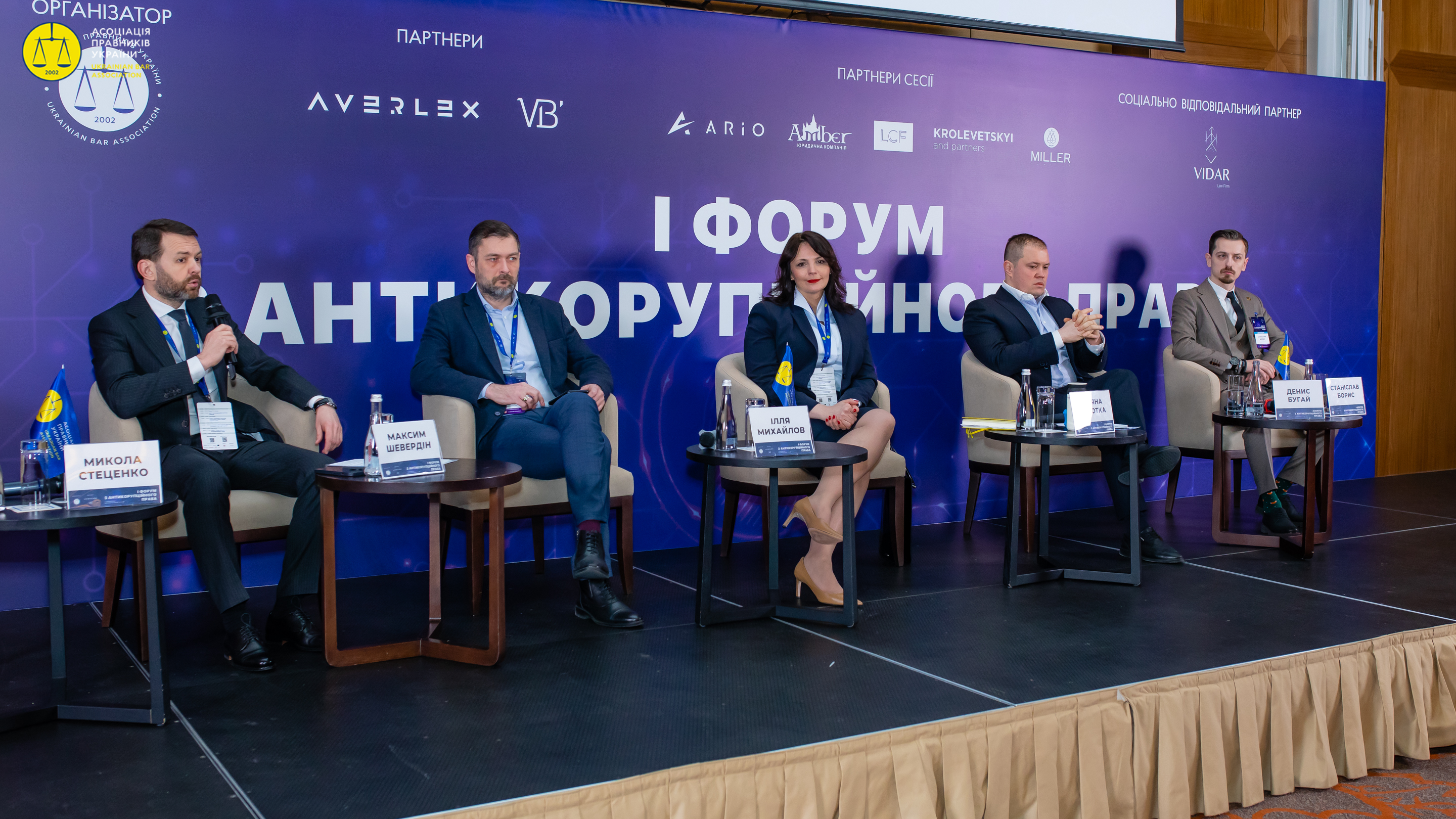
The event was opened by Mykola Stetsenko, President of the Ukrainian Bar Association, Managing Partner at AVELLUM. In his welcoming remarks, he expressed hope that the forum would not only criticize and propose ideas, but also discuss achievements and accomplishments. Mr. Stetsenko noted that it is important to talk not only about punishment for corruption, but also about prevention of corruption offenses.

The President of the UBA thanked the authors of the forum idea and the organizing committee, as well as the event partners - AVER LEX and VB PARTNERS, sessions partners - Ario Law Firm, Amber Law Company, Krolevetsky & Partners, Miller Law Firm, LCF Law Group, and socially responsible partner - Vidar.
The first session of the forum was devoted to anti-corruption policy in the country. The discussion was moderated by Maksym Sheverdin, Partner, Head of WCC at LCF Law Group, Chairman of the UBA Committee on Criminal and Criminal Procedural Law.
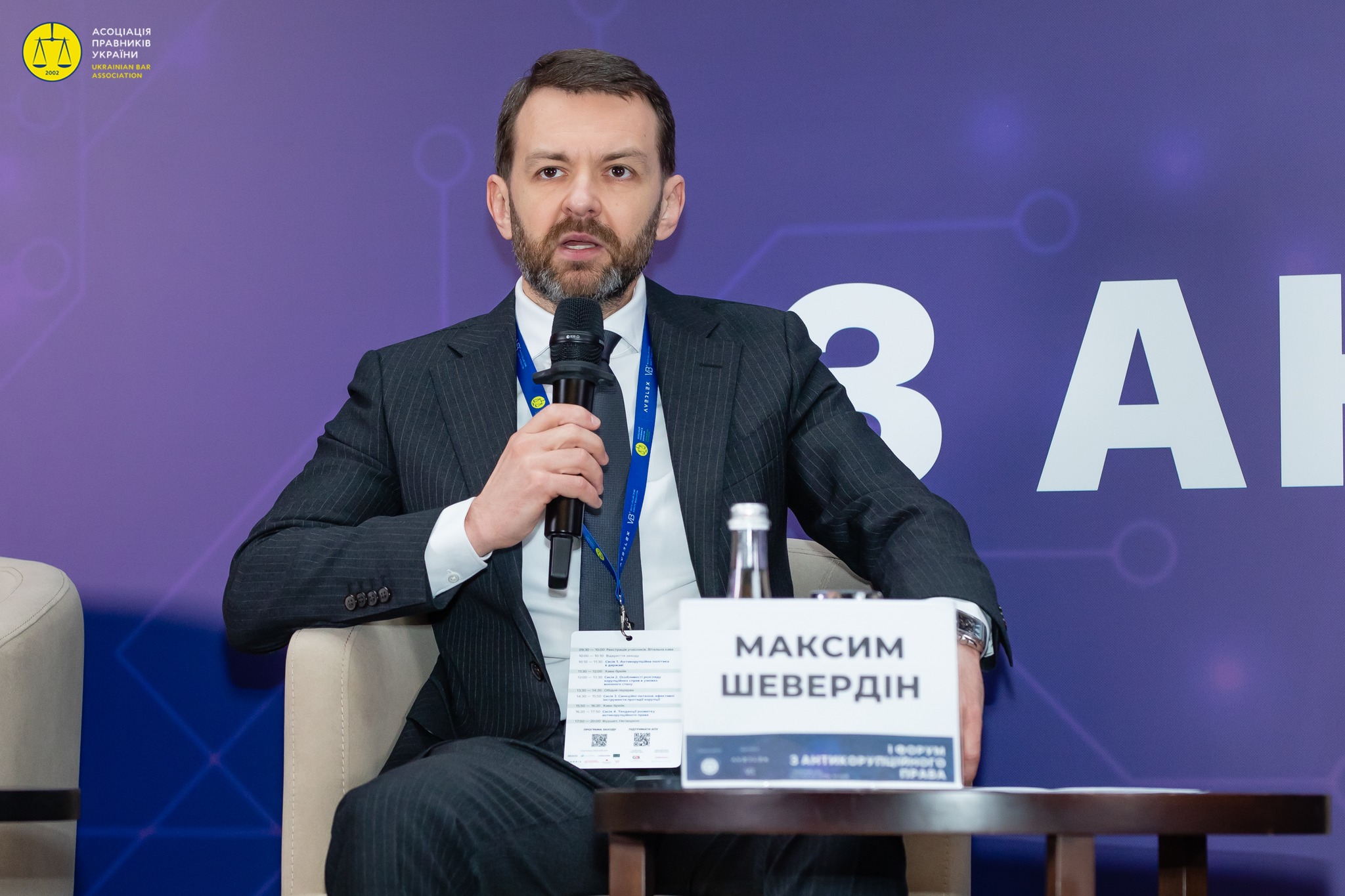
At the beginning of the discussion, Mr. Sheverdin outlined the latest changes and innovations in the anti-corruption sphere:
- restoration of declaration;
- increase in the NABU staff;
- attempts to expand the powers of the NACP;
- adoption of the Law of Ukraine "On Fair Lobbying".
Tetyana Korotka, Deputy Business Ombudsman, addressed the topic of improving law enforcement and good administration as a strategy to prevent corruption in government agencies. She reminded that the Business Ombudsman Council (BOC) was involved in the development of the Law on Administrative Procedure. According to her, the BOC is now working on extending the scope of this act to other state authorities.
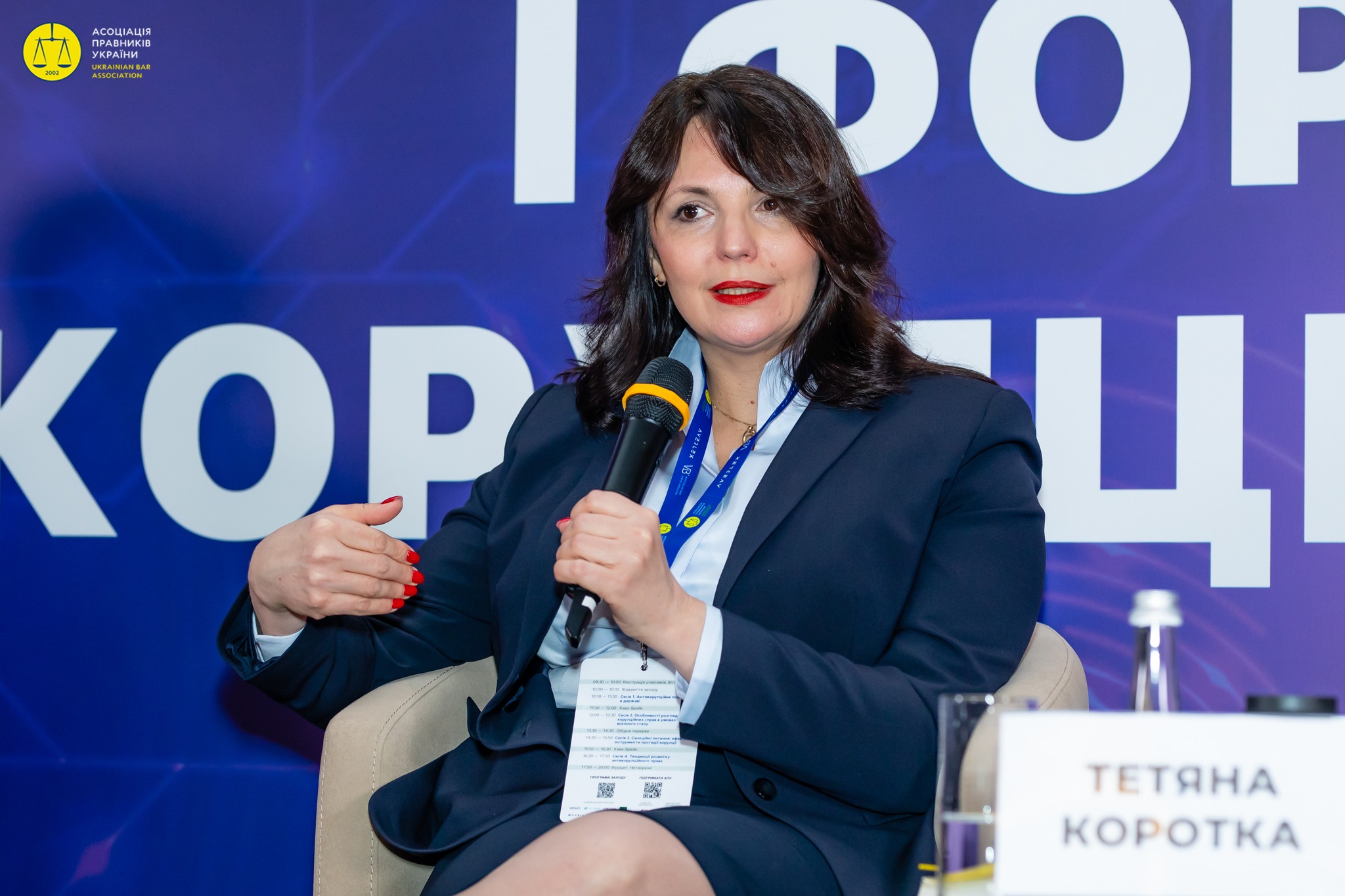
Ms. Korotka said that a declaration of good administration is also being prepared. The BOC seeks to provide feedback to government agencies on their work, including pointing out possible mistakes, the Deputy Business Ombudsman emphasized.
Iliya Mykhaylov, Chairman of the Supervisory Board of Prozorro.Sale, explained how this system of online auctions for the sale and lease of property has become an instrument of the state's anti-corruption policy in the field of public sector asset management. According to him, the fiscal effect of almost 8 years of the system's operation is over UAH 85 billion. Mr. Mykhailov cited the sale of the Kyiv Central Bus Station as an example of successful privatization of an asset through Prozorro.Sale.
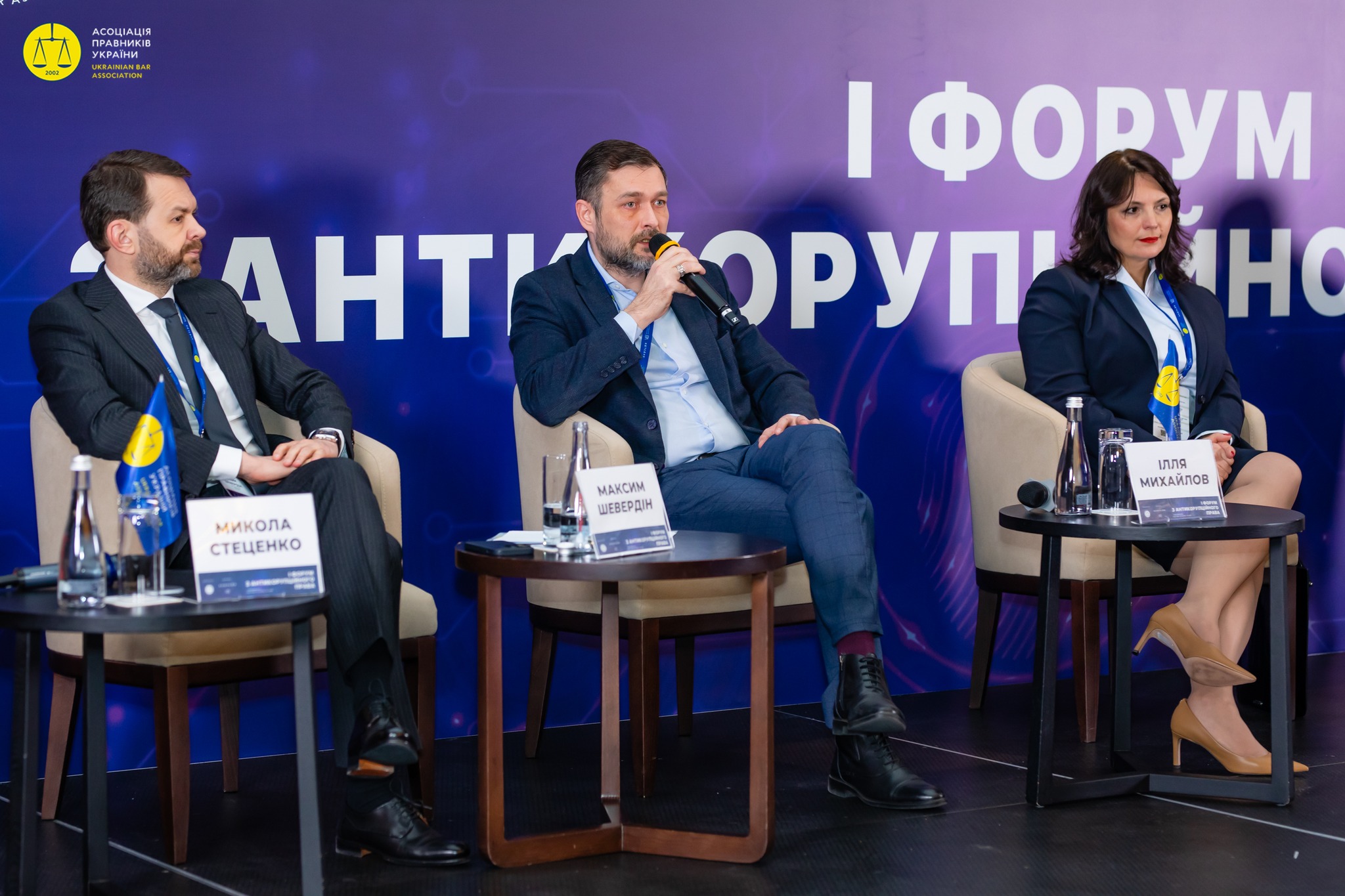
"It is the rules of the game that are fixed in the legislative field and supported by relevant practices, in particular from the point of view of the judicial system, that are one of the key elements of building trust. This trust directly affects all relations in the "golden" triangle of business, government and society," emphasized Iliya Mikhailov, adding that trust also allows building relations with Ukraine's international partners.
Speaking about corruption, the Chairman of the Supervisory Board of Prozorro.Sale noted that it is caused by discretionary powers that are often abused by officials.
Denys Bugay, Co-Founding Partner at VB PARTNERS, delivered a presentation on "Violation of the jurisdiction of the HACC as an element of excessive workload" (PRESENTATION). He cited some figures that, according to him, indicate an increase in the workload of the High Anti-Corruption Court of Ukraine:
2022 / 2023:
- criminal proceedings received by the HACC - 268 / 344, of which 49 / 84 were considered, 219 / 260 were not considered;
- procedural appeals received by the HACC - 6719 / 10,944, of which 6594 / 10,849 were considered; not considered - 125 / 95.
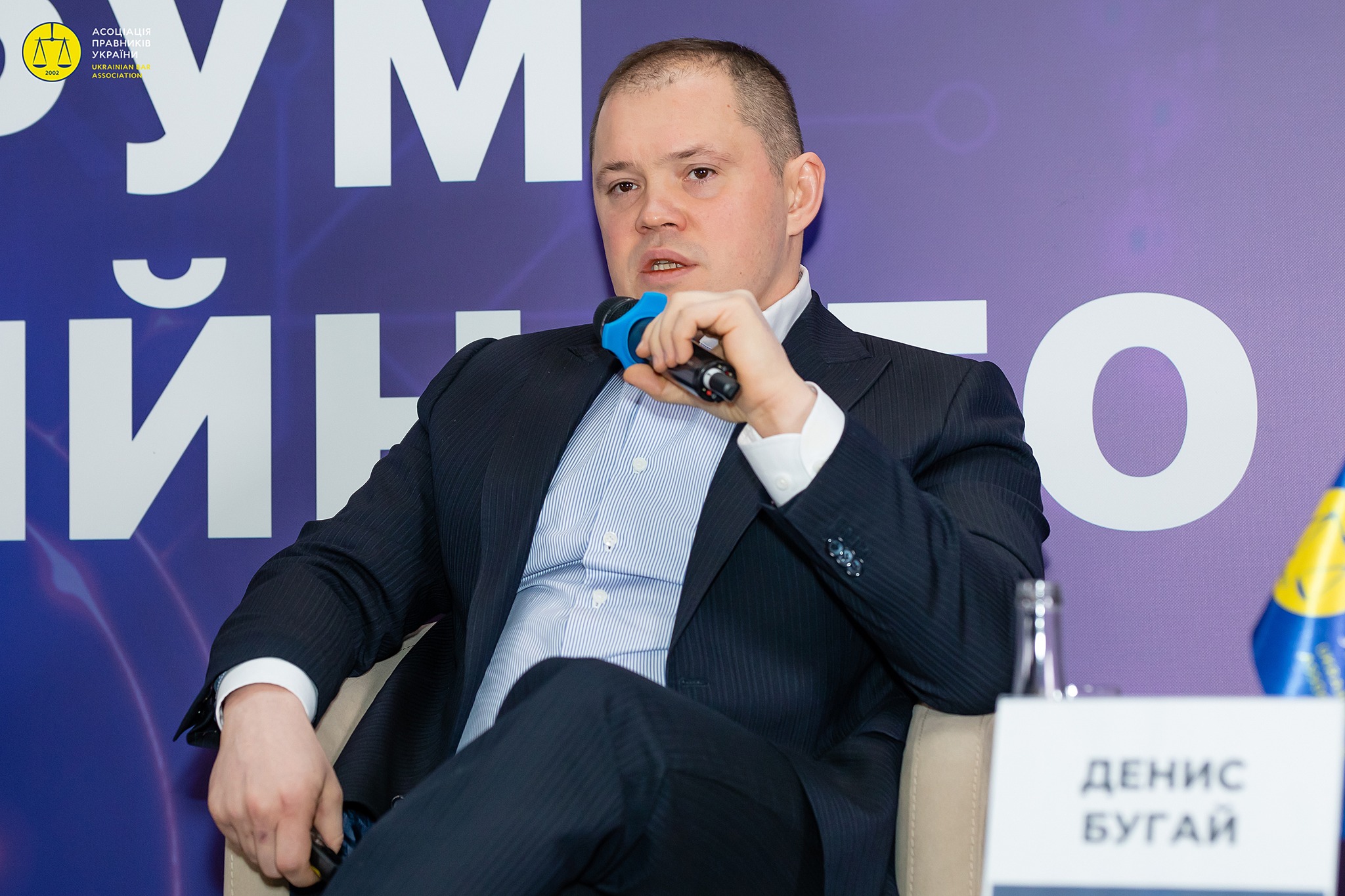
According to Denys Bugay, the increase in the workload of the High Anti-Corruption Court was also caused by its additional specializations, in particular, the recovery of unjustified assets and the "confiscation of assets" of the aggressor country's accomplices. These areas distract the HACC from its main task of reviewing criminal proceedings, the lawyer noted.
Mr. Bugay also expressed the opinion that the HACC is considering a number of proceedings that are not under its jurisdiction. He cited the PrivatBank case as an example. Among the ways to solve the problem, Co-Founding partner of VB PARTNERS suggested the following:
- the prosecution must prove that the case really belongs to the category of anti-corruption cases;
- restrictions are needed so that the prosecution does not overload the court with procedural appeals.
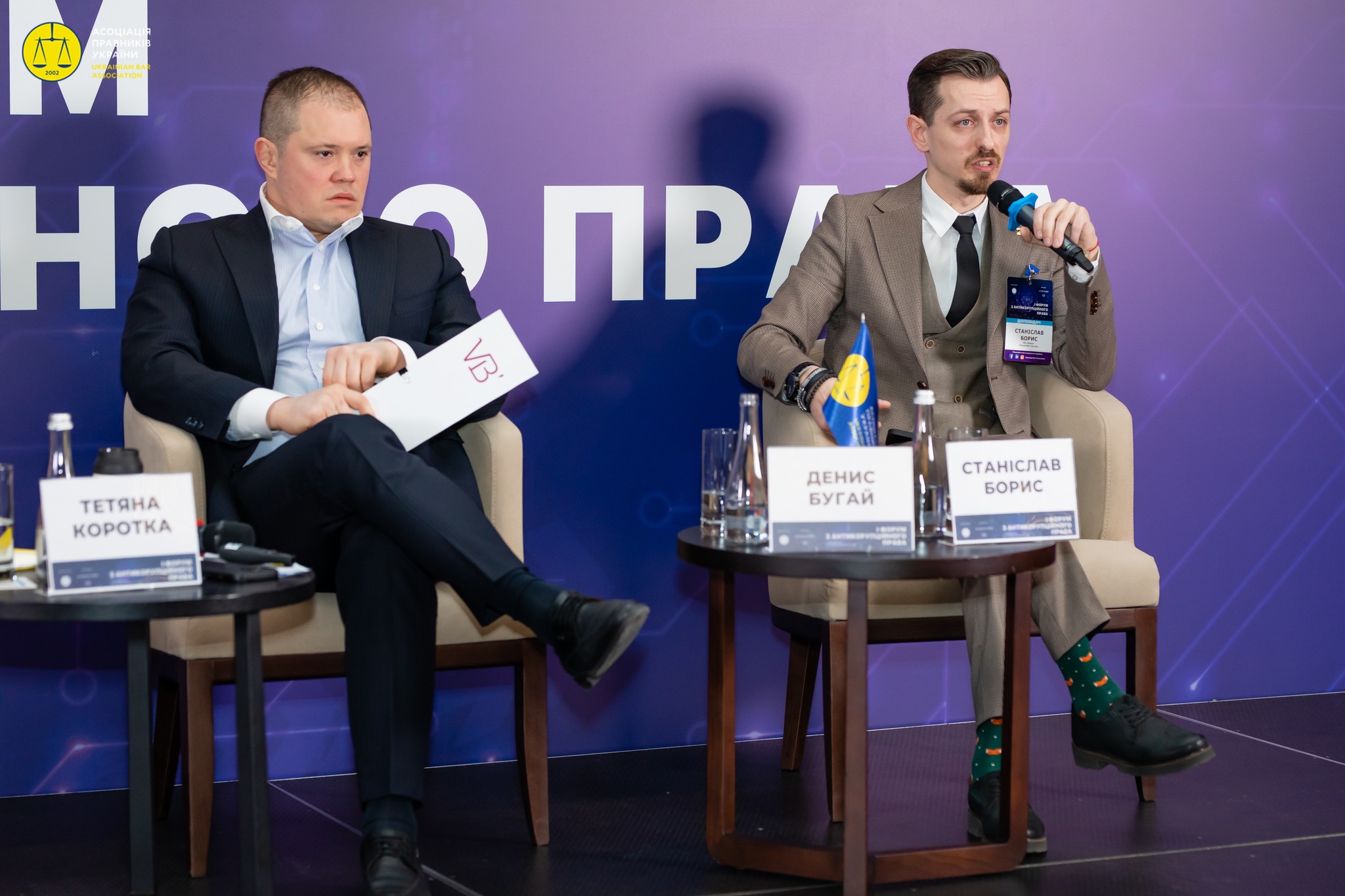
Stanislav Borys, Managing Partner of Vidar Law Firm, Member of the Board of the UBA Committee on Criminal and Criminal Procedural Law, shared his thoughts on the practical implementation of anti-corruption policy in the country. Among the issues that need to be addressed, he mentioned
- regulation of the mechanism for concluding agreements with compensation for damages;
- creation of a mechanism that will at least partially open classified court rulings and decisions;
- the problem of determining the amount of bail;
- settlement of the issue of lost profits in the form of damages.
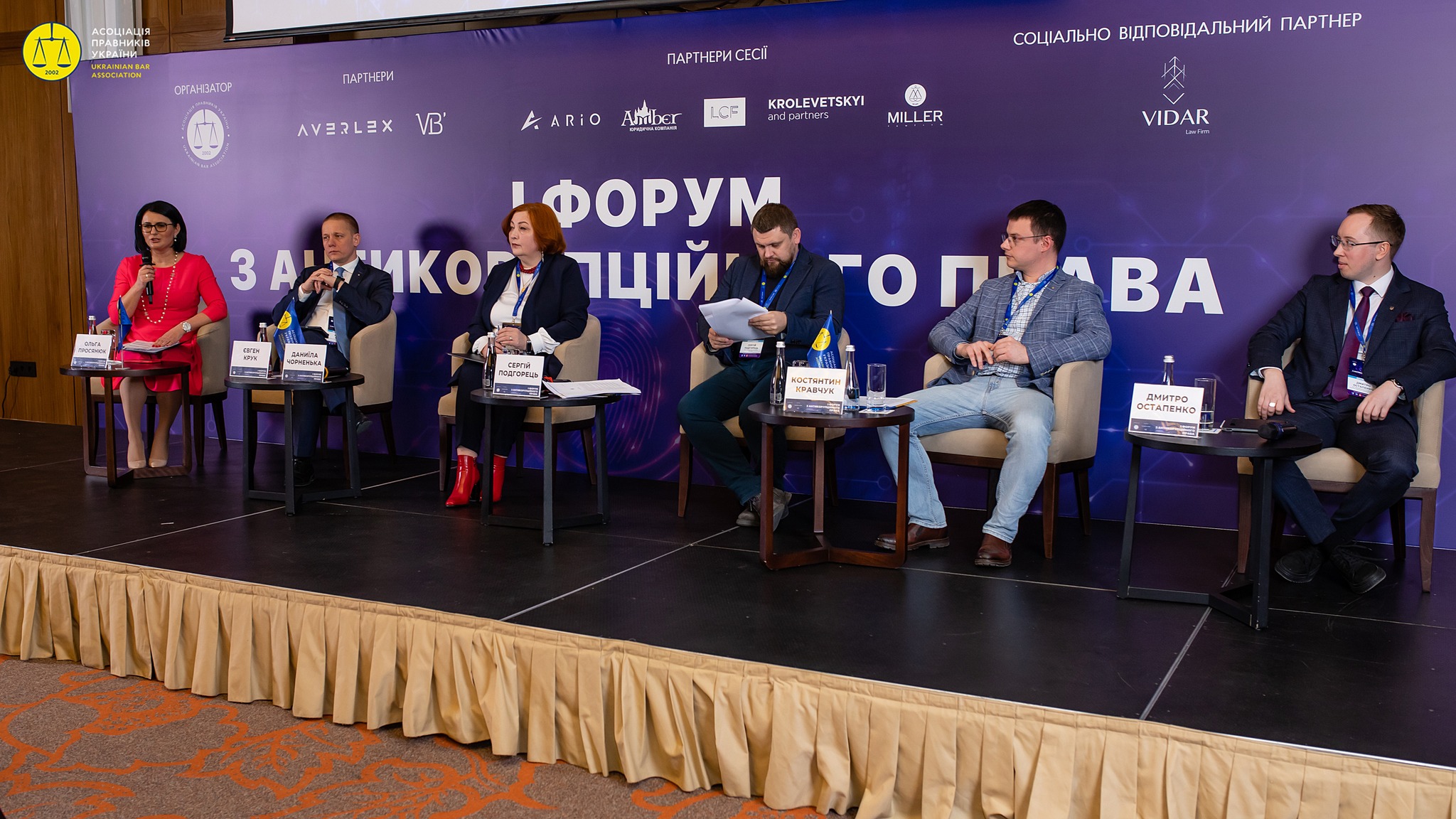
The second session of the Forum on Anti-Corruption Law was entitled "Peculiarities of consideration of corruption cases under martial law". The session was moderated by Olga Prosyanyuk, Managing Partner of AVER LEX.
Yevhen Kruk, Judge of the High Anti-Corruption Court of Ukraine, in his speech covered the topic "The role of opening statement for the examination of evidence. Submission of written evidence". He noted that, in his opinion, justice is better than fair justice, it is effective and efficient justice, which means "making a quality decision within a reasonable time after a fair hearing".
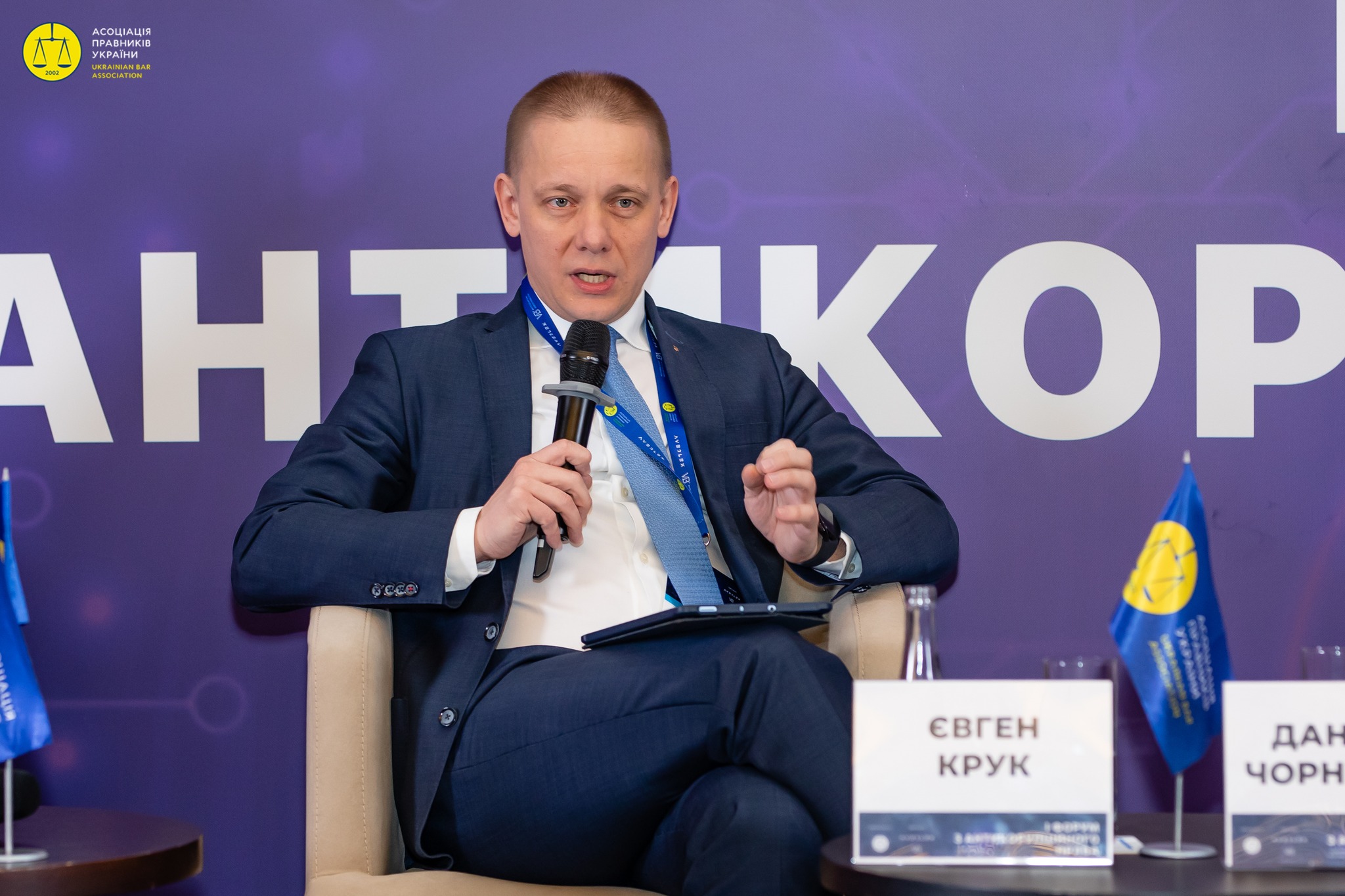
According to Mr. Kruk, the court is obliged to observe reasonable time limits, direct examination of evidence, adversarial proceedings and the principle of presumption of innocence (which is the most important). Compliance with these principles can only be guaranteed if all parties to the process strictly adhere to the CPC of Ukraine, the judge added.
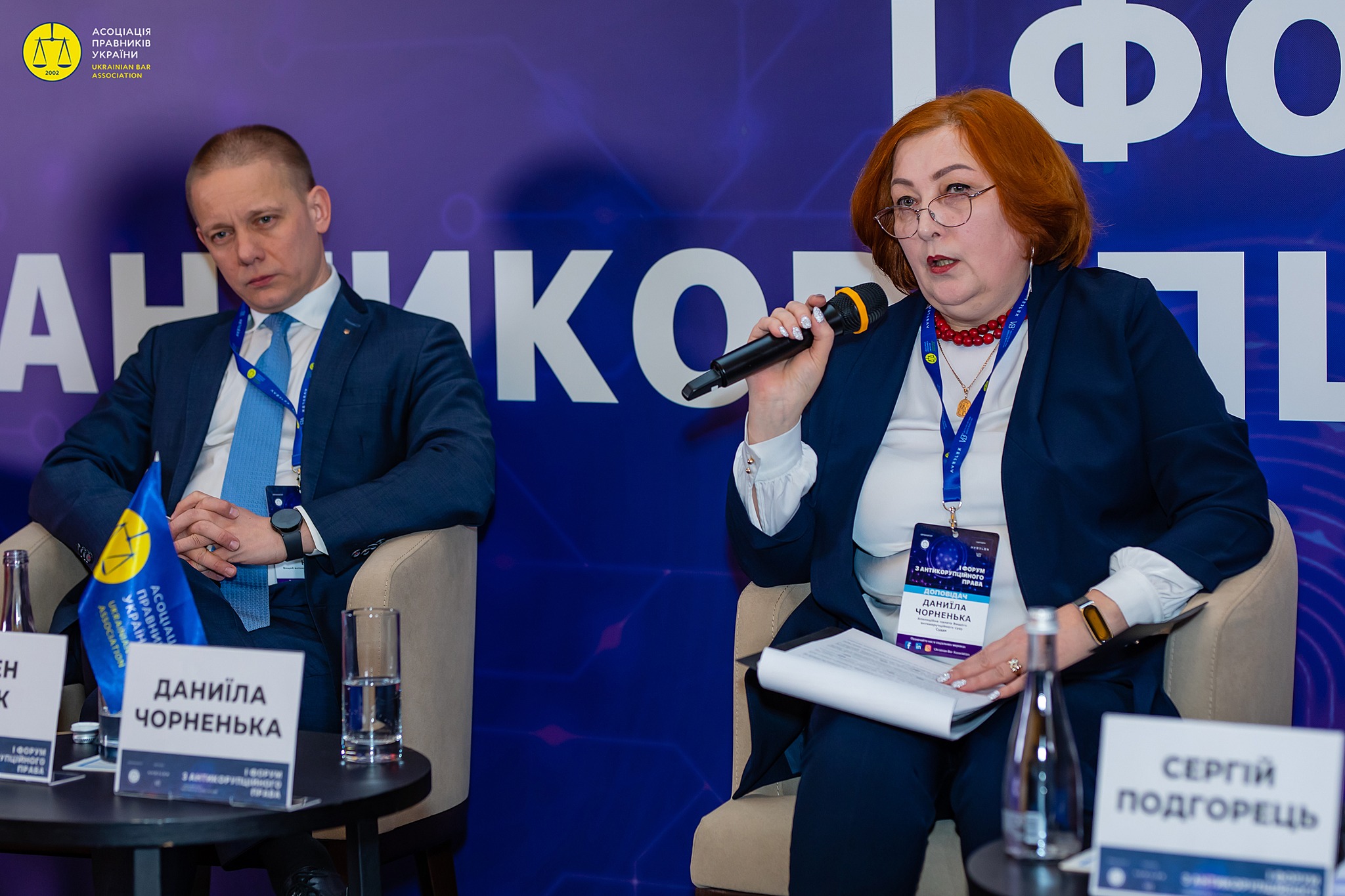
The nuances of holding a court hearing via videoconference under martial law were discussed in her report by Daniyila Chornenka, Judge of the Appeals Chamber of the High Anti-Corruption Court, the first Head of the HACC Appeals Chamber. In particular, she criticized the video interrogation of a witness who is allegedly abroad, as the court does not check whether the person crossed the border. According to Ms. Chornenka, this aspect needs to be changed.
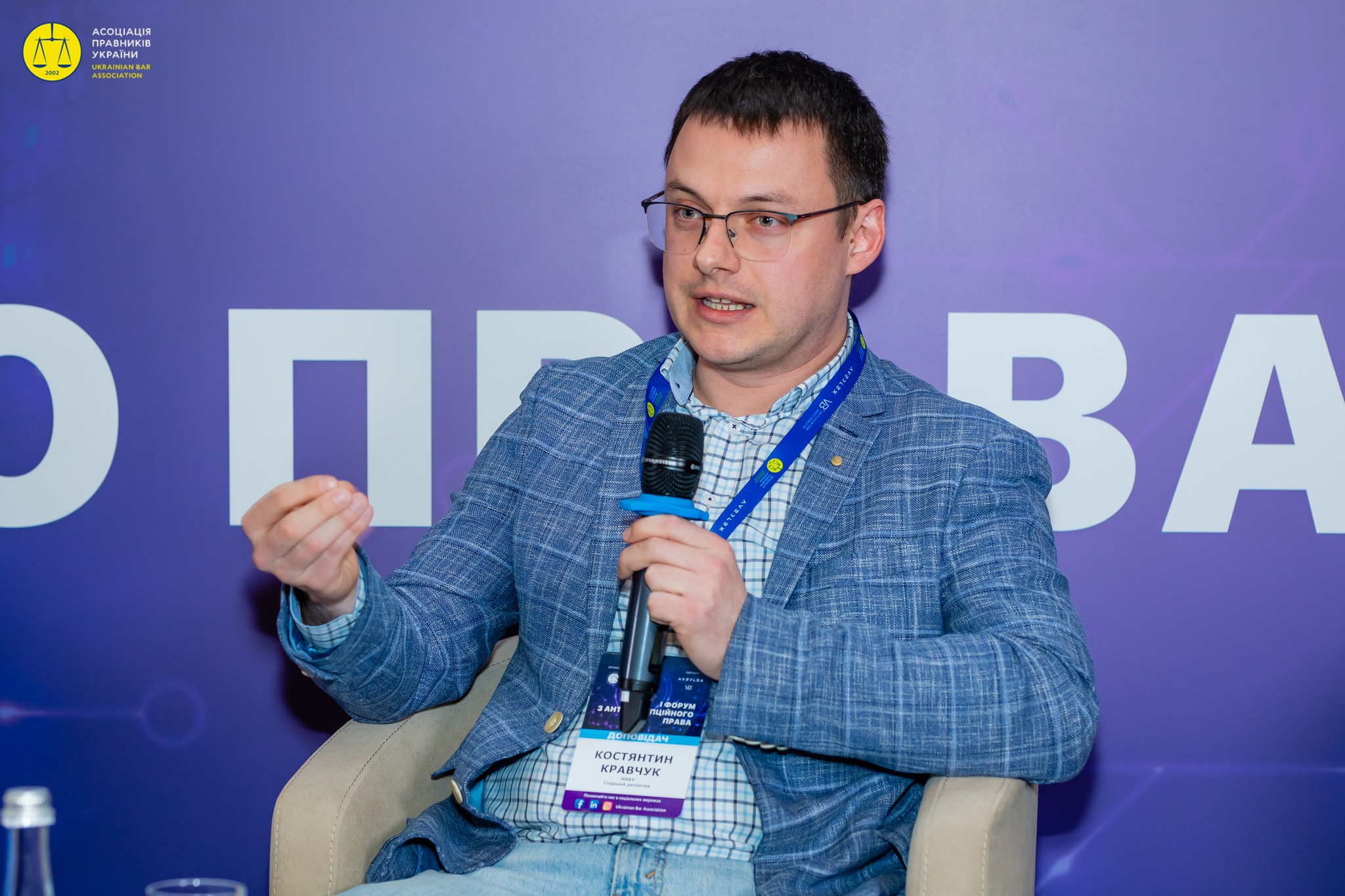
Kostiantyn Kravchuk, Senior Detective - Deputy Head of the Third Detective Division of the Second Detective Unit of the Main Detective Unit of the NABU, delivered a presentation on "Plea bargains in corruption crimes: a balance between the public interest and the principle of inevitability of punishment".
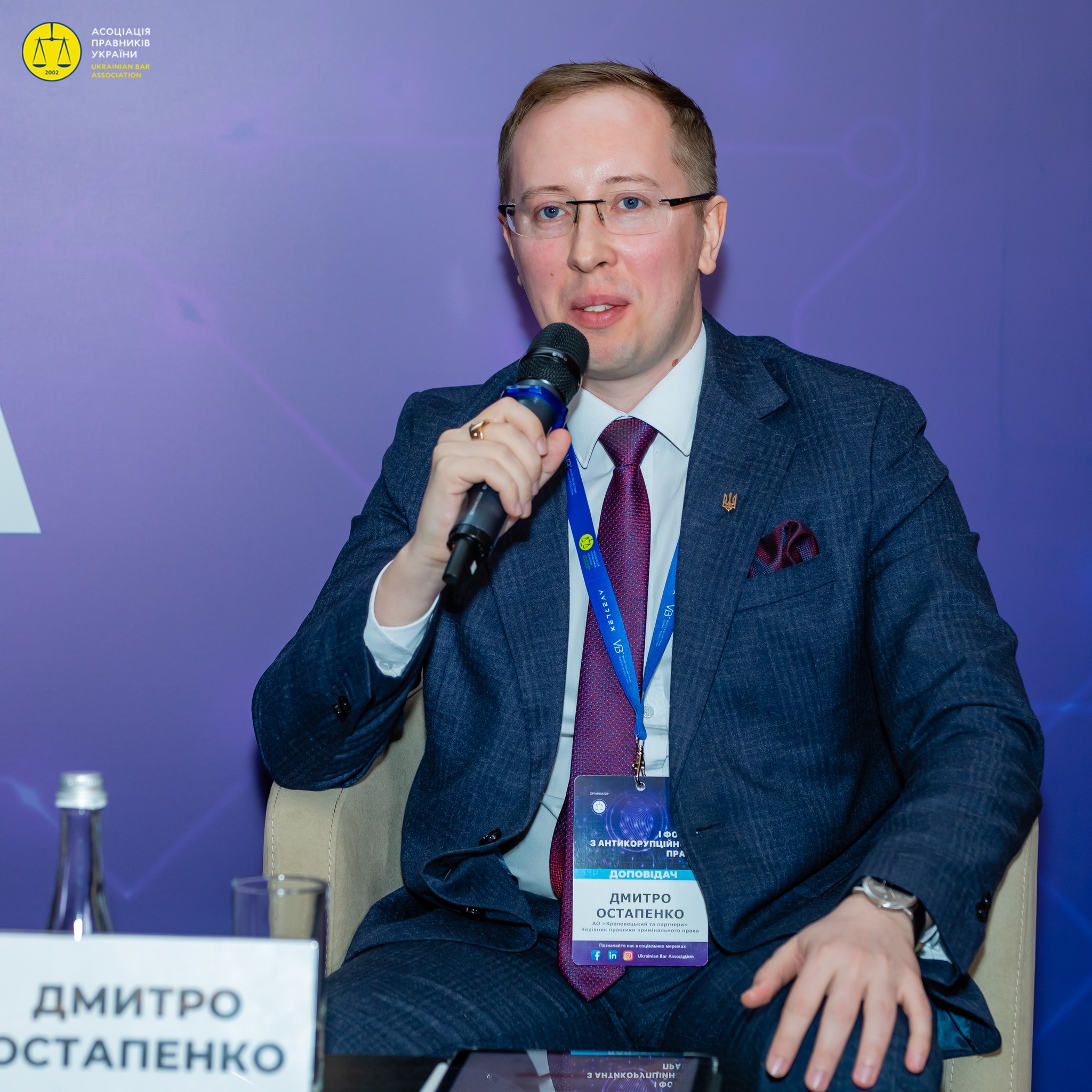
Dmytro Ostapenko, Head of Criminal Law Practice at Krolevetsky & Partners Law Firm, spoke on "Negative tendencies of the High Anti-Corruption Court to go beyond the charges of corruption crimes: review of practice and discussion of possible ways to counteract them".
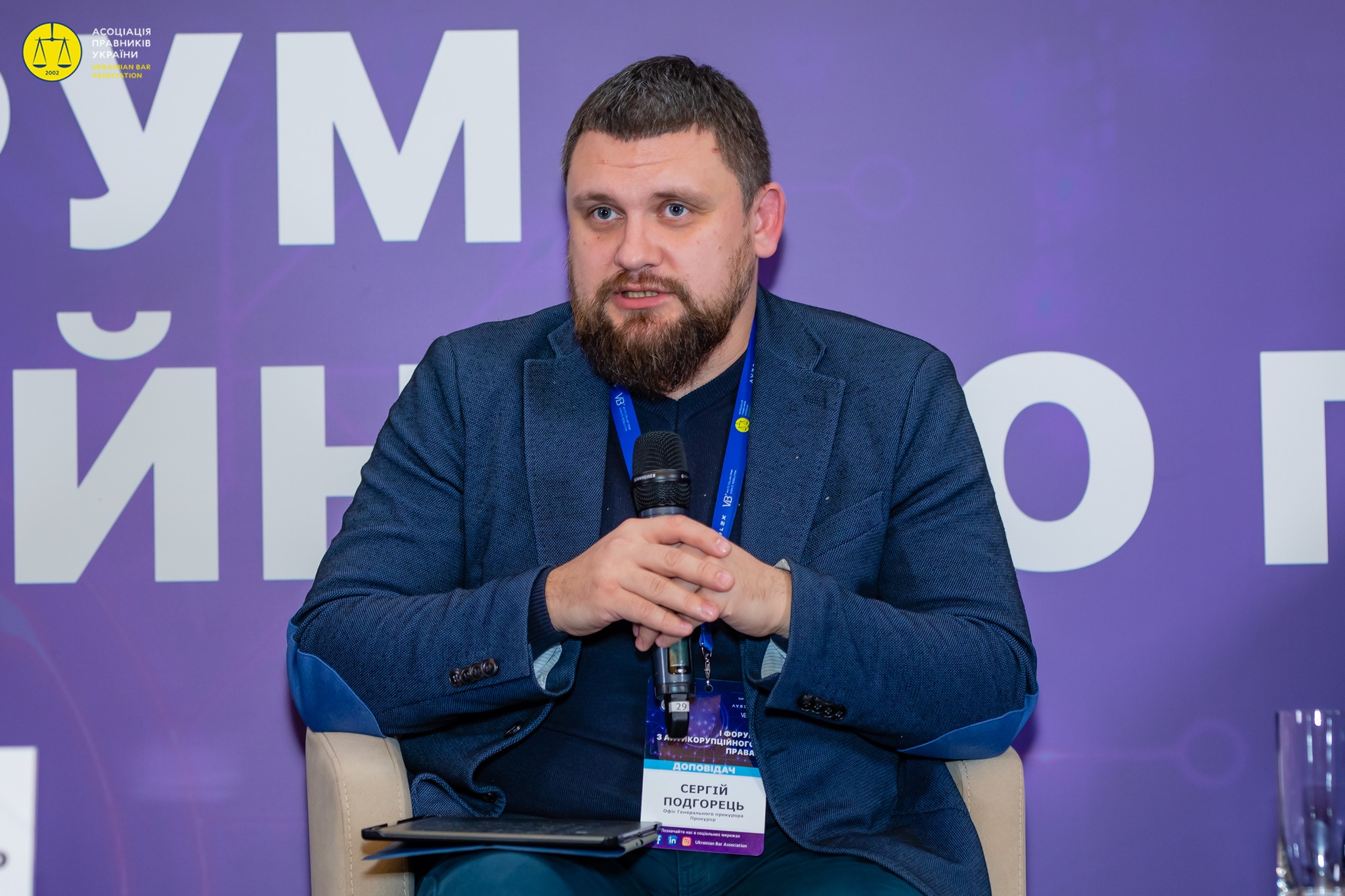
Serhiy Podhoretz, prosecutor of the sixth department of the Specialized Anti-Corruption Prosecutor's Office of the Prosecutor General's Office, also took part in the discussion.
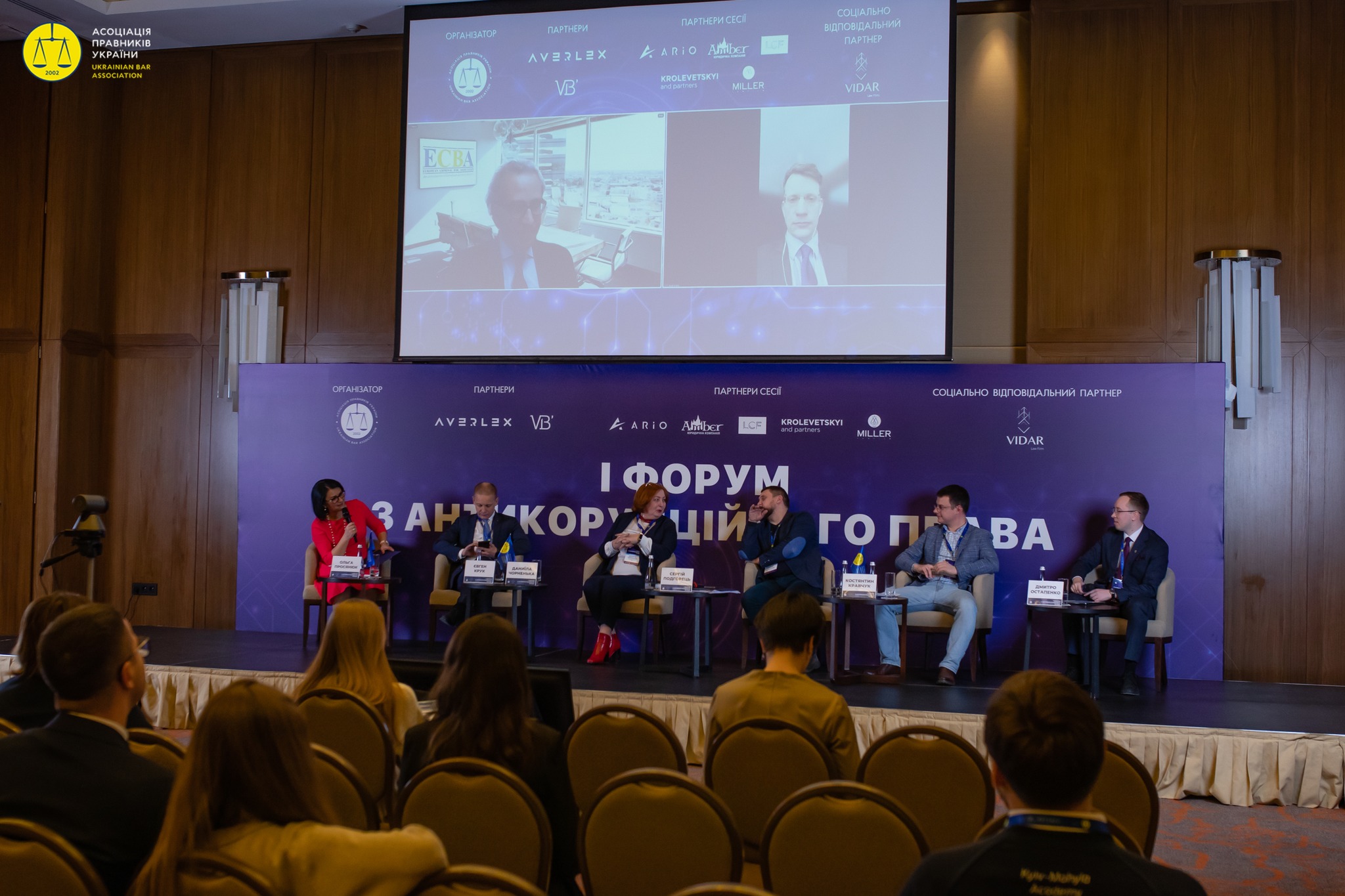
Amedeo Barletta, criminal lawyer, Vice-Chair of the European Criminal Bar Association (ECBA) and Co-Chair of the Anti-Corruption Law Working Group (ACE WG) (Italy), and Vladimir Hrle, attorney at law, member of the ECBA Advisory Board and Co-Chair of the ACE WG (Serbia), joined the discussion online. They touched upon the topic "ECBA Position on the EU Commission Anti-Corruption Directive".
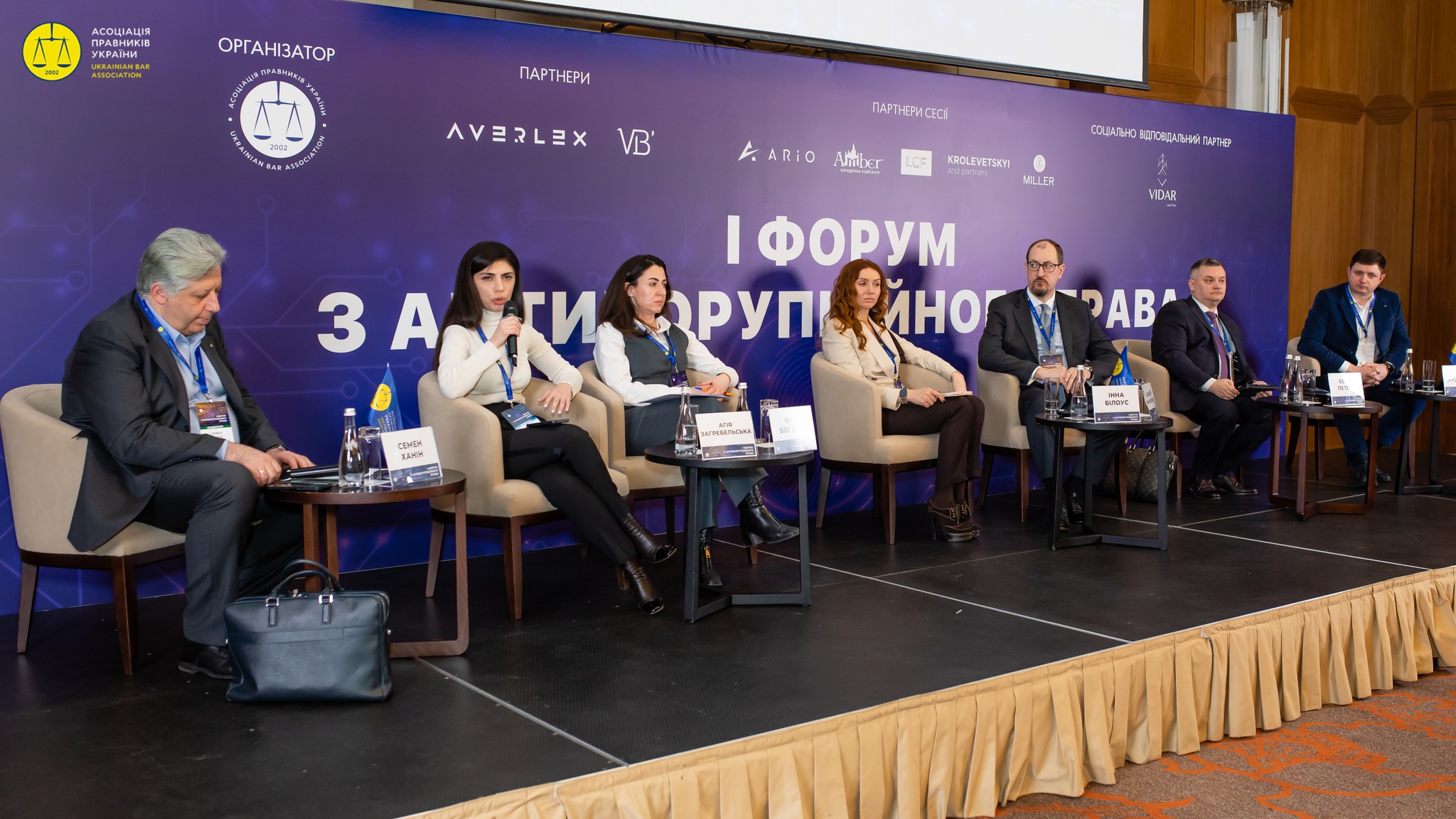
The third session of the forum was titled "Sanctions issues: effective tools for combating corruption". The moderator of the session was Semen Khanin, PhD in Economics, Attorney at Law, Honored Lawyer of Ukraine, Managing Partner of Amber Law Company.
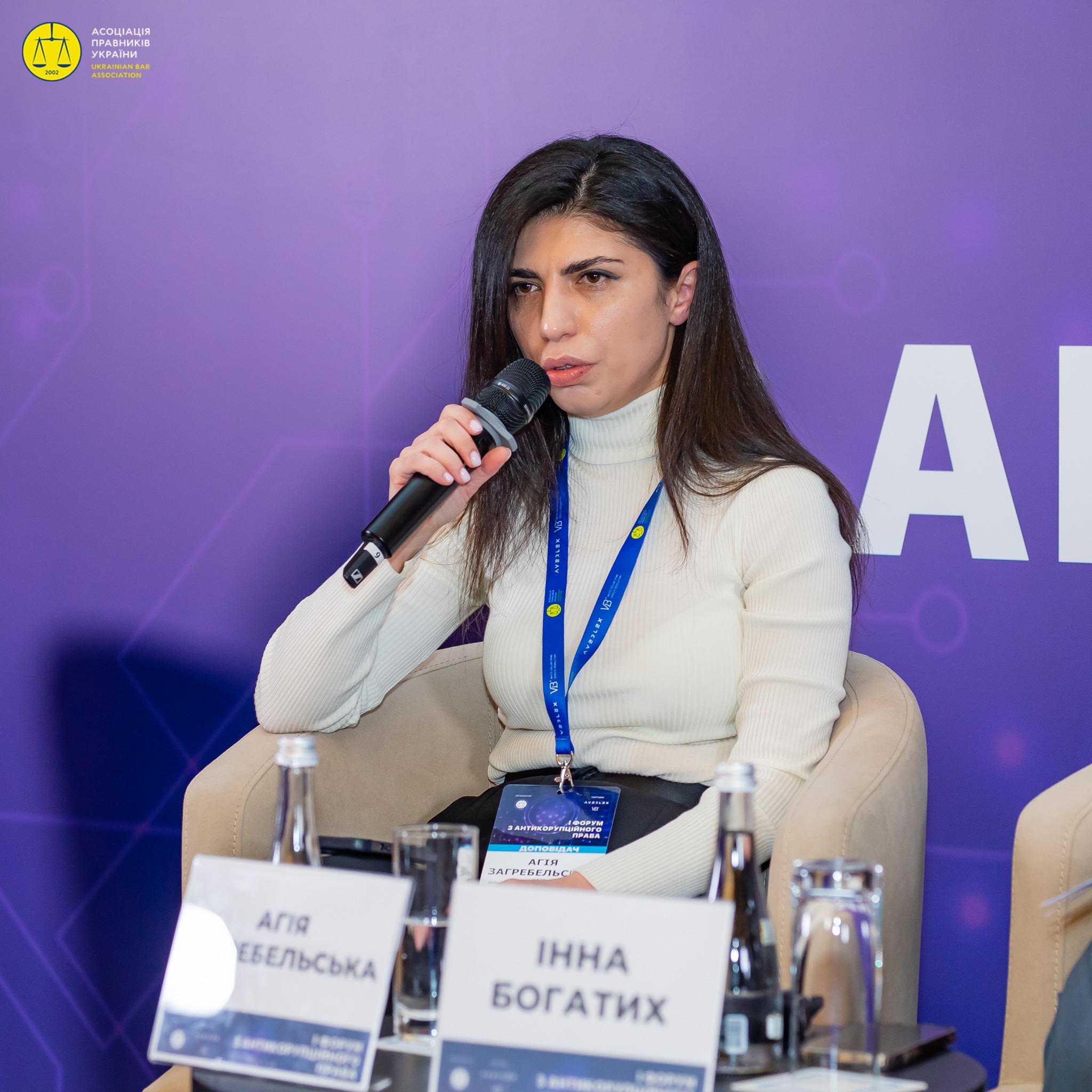
Agiya Zagrebelska, Head of Corruption Risk Mitigation in the NACP Sanctions Policy, emphasized the impact of sanctions on the Russian economy and Russia's ability to wage a full-scale war against Ukraine. She also touched upon the issue of ethical actions of businesses that continue to trade with the aggressor country and do business there.
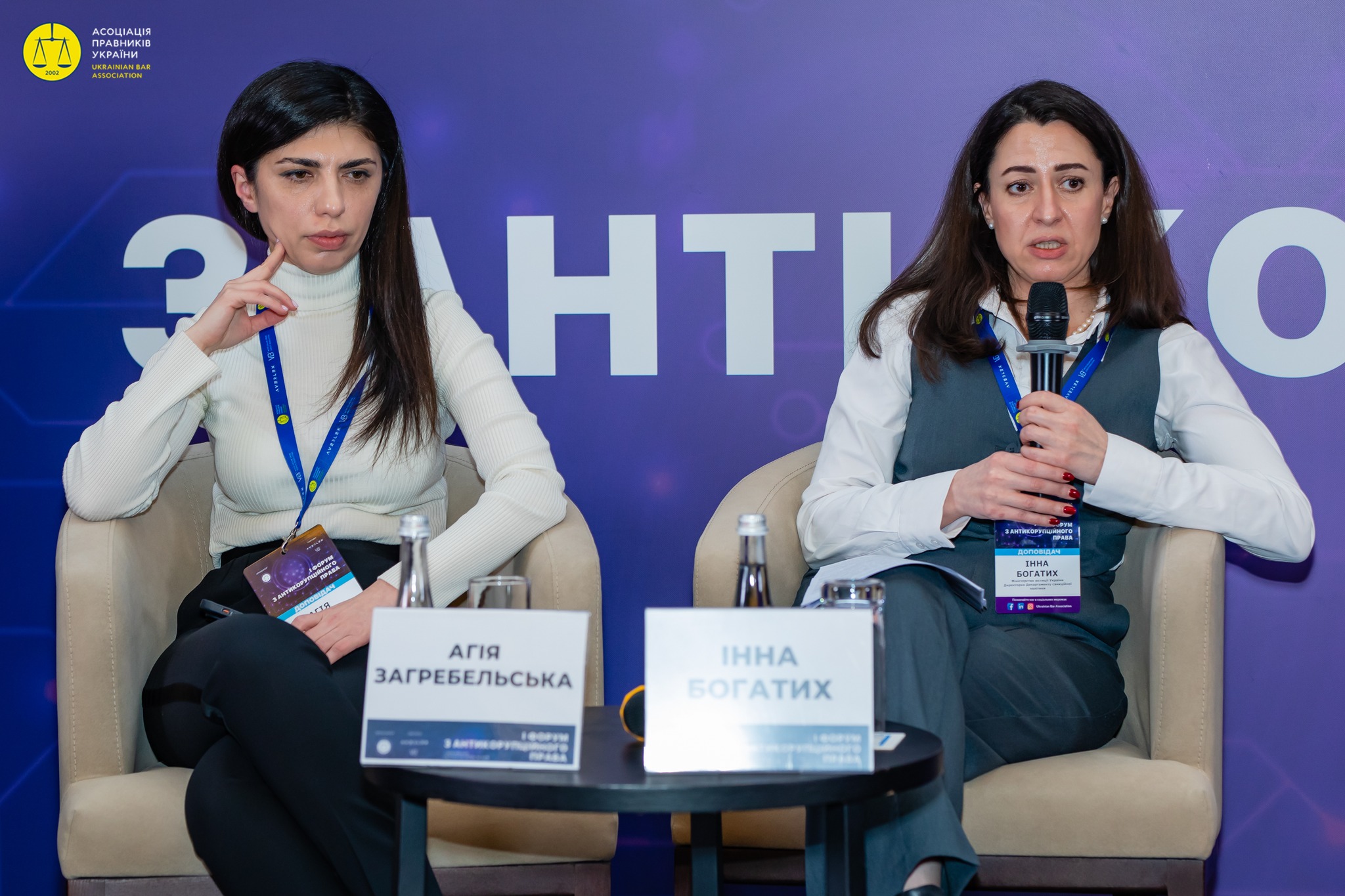
Inna Bohatykh, Director of the Sanctions Policy Department of the Ministry of Justice of Ukraine, delivered a presentation "Sanctions and Good Conduct. The fine line between protecting business and circumventing sanctions". She reported that as of today, 42 claims for recovery of assets of sanctioned persons to the state revenue have been filed with the HACC, 34 of which have already entered into force, and eight more are under consideration. In particular, as a result of the claims, about UAH 162 million was recovered and transferred to the state budget.
Speaking about the problem of violation of the sanctions regime, Inna Bogatykh expressed her hope that Ukraine will introduce liability for circumvention of sanctions.
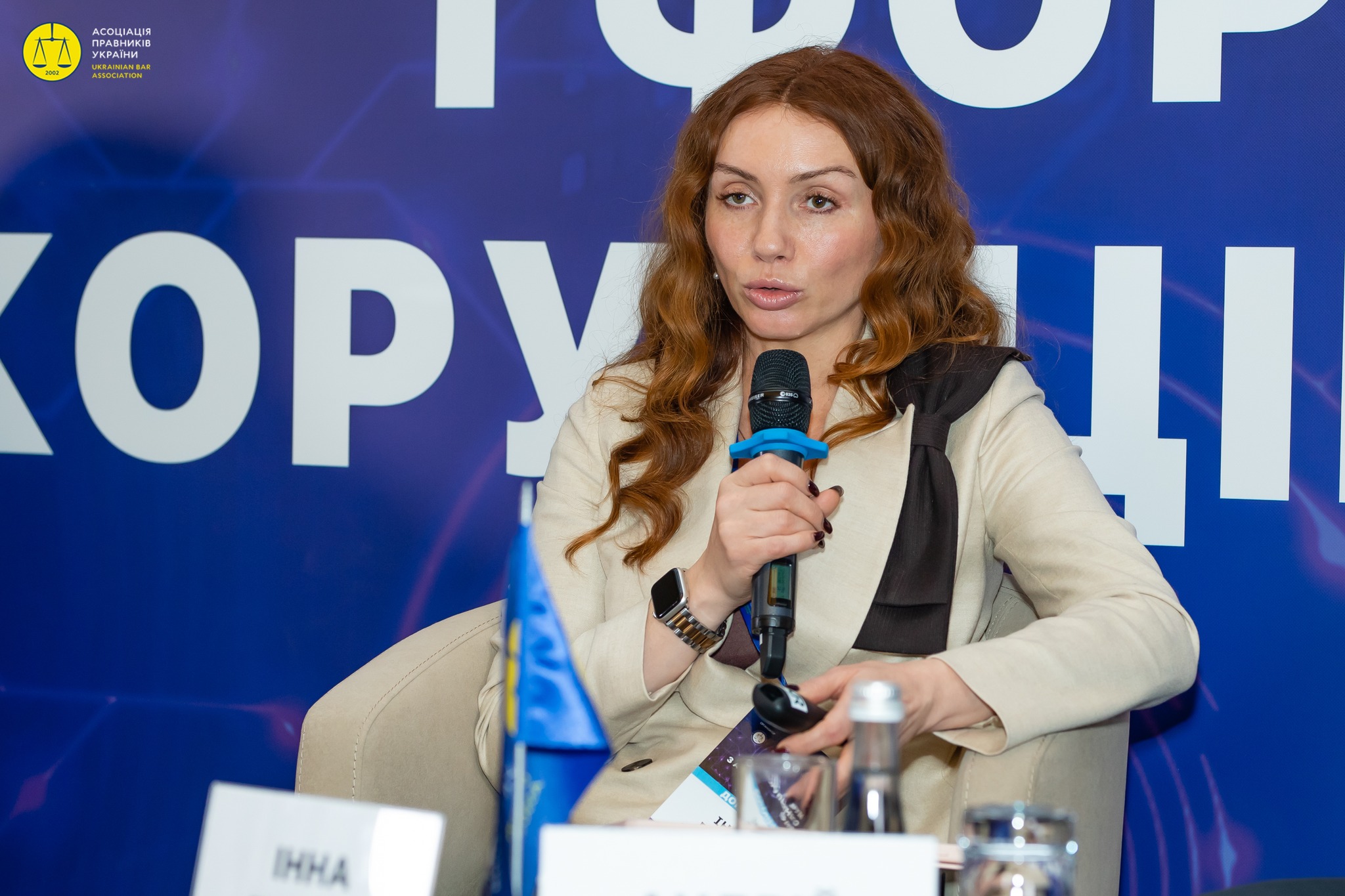
Inna Bilous, Judge of the High Anti-Corruption Court of Ukraine, familiarized the audience with the peculiarities of the HACC's consideration of sanctions cases (PRESENTATION). She said that the court had received a total of 44 claims for sanctions, of which 36 were satisfied, including partially, two were returned to the plaintiff, and six more cases are still under consideration.
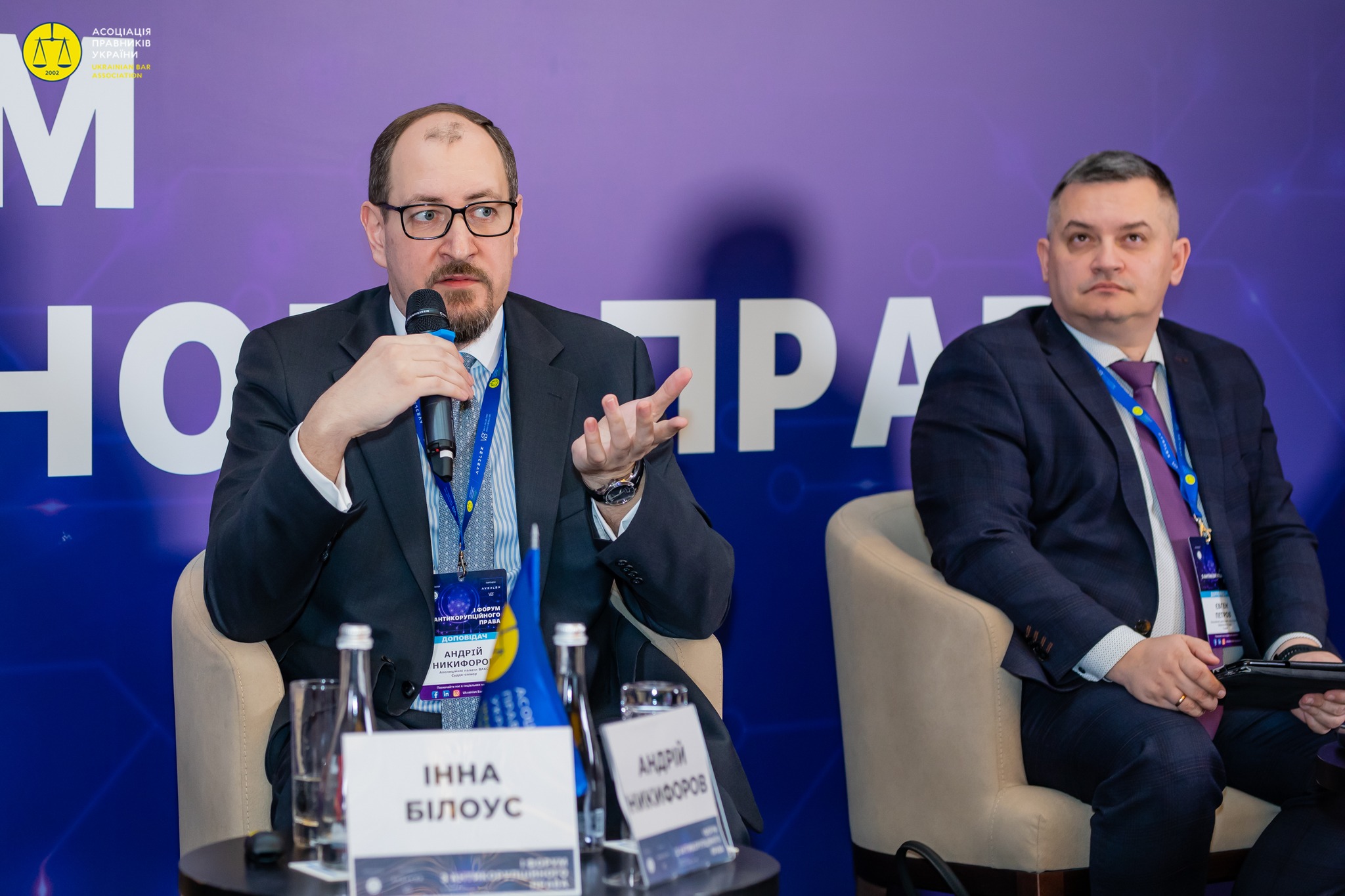
Continuing the topic of Ms. Bilous' report, Andriy Nikiforov, Judge-Speaker of the HACC Appeals Chamber, noted that the key issue in sanctions cases is the involvement of the sanctioned person in the ownership or management of property that may be subject to recovery. According to him, it is necessary to find out whether this is a bona fide purchaser or a scheme to "cover" their ownership to avoid sanctions.
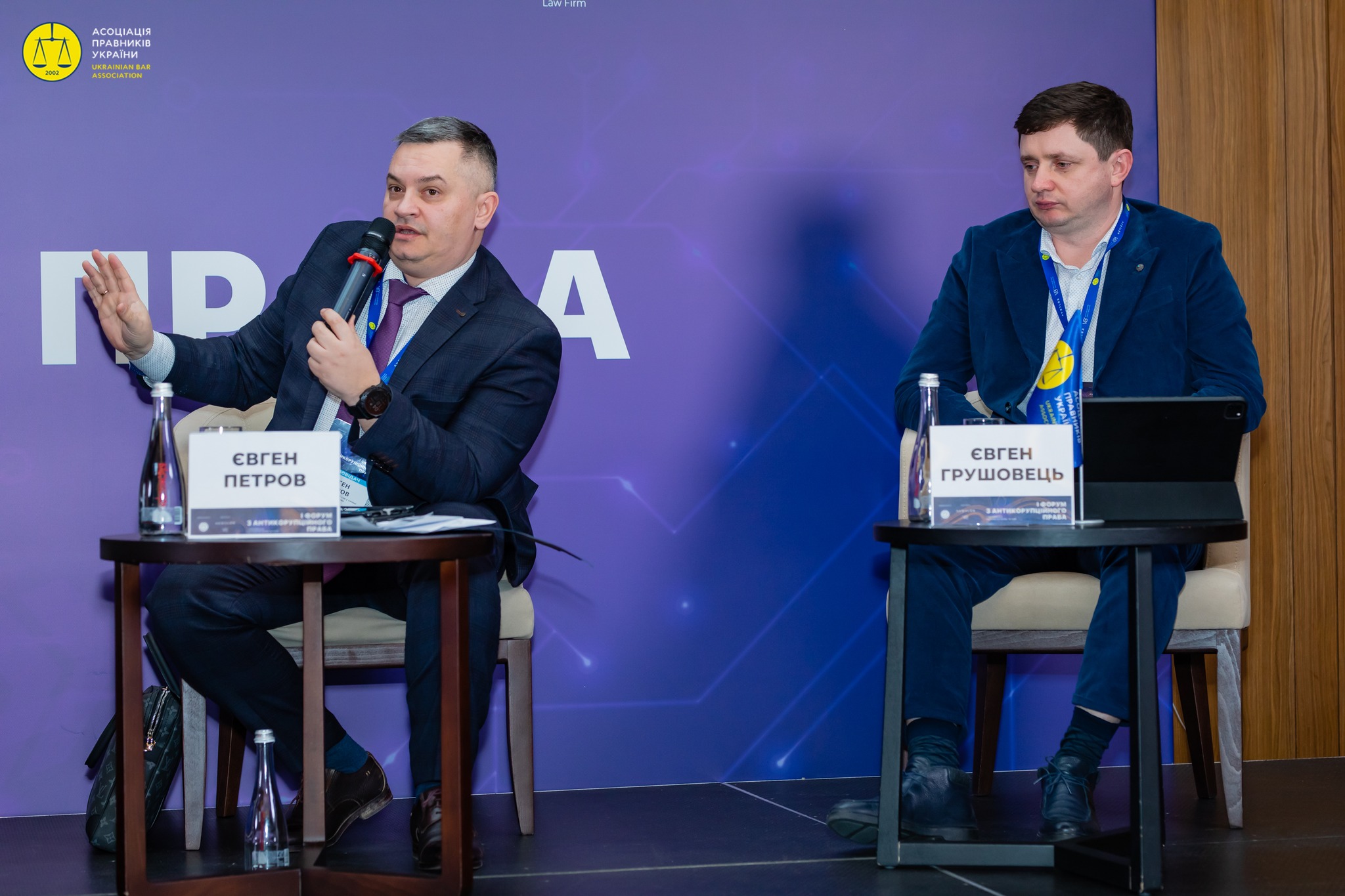
Yevgen Petrov, Judge of the Civil Court of Cassation of the Supreme Court, Doctor of Law, familiarized the audience with the practice of his court in cases of recognition of assets as unjustified and their recovery to the state revenue (PRESENTATION). Yevhen Hrushovets, Partner at Ario Law Firm, Head of the Public Anti-Corruption Council at the Ministry of Defense of Ukraine, presented his report entitled "Russian Trail and Sanctions Mechanism: Widespread Abuse of Law Enforcement".
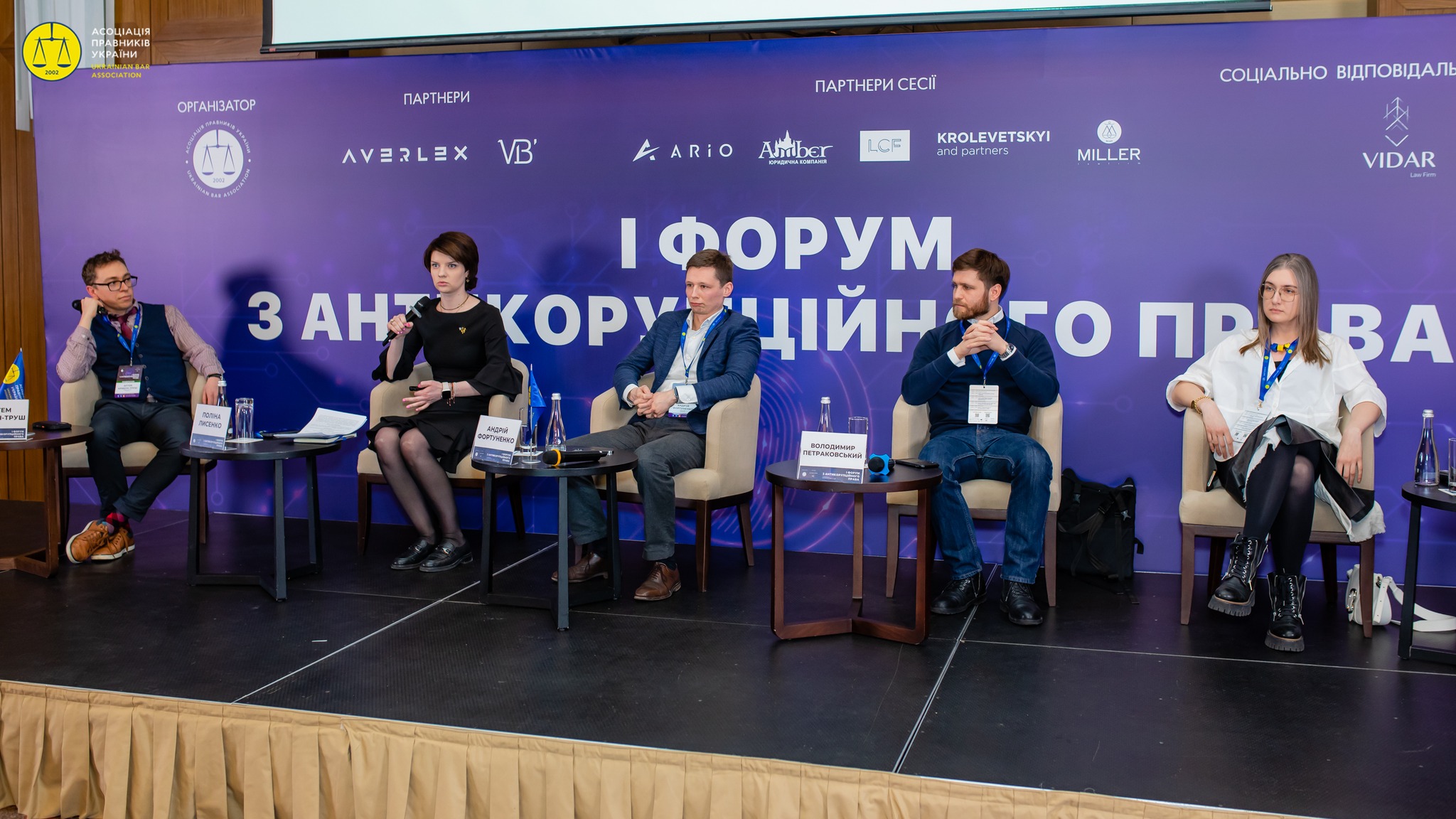
The 1st Forum on Anti-Corruption Law ended with the fourth session, devoted to trends in the development of anti-corruption law. The discussion was moderated by Artem Krykun-Trush, partner at Miller Law Firm.
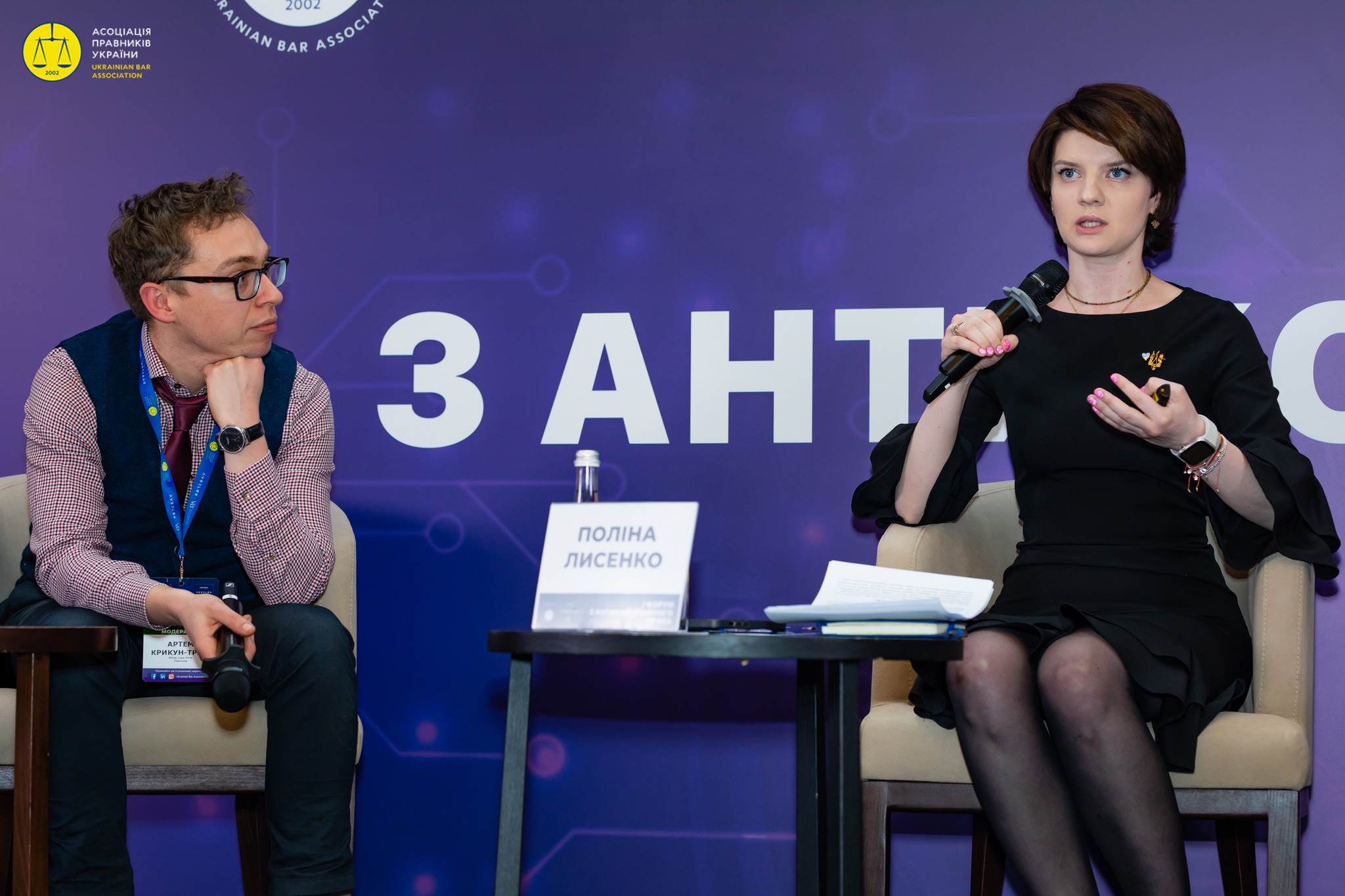
Polina Lysenko, Deputy Director of the National Anti-Corruption Bureau of Ukraine, spoke about changes in legislation in connection with Ukraine's future membership in the Organization for Economic Cooperation and Development (OECD) Working Group on Combating Bribery (PRESENTATION). In this context, she paid attention to the issue of introducing criminal liability for legal entities for international bribery.
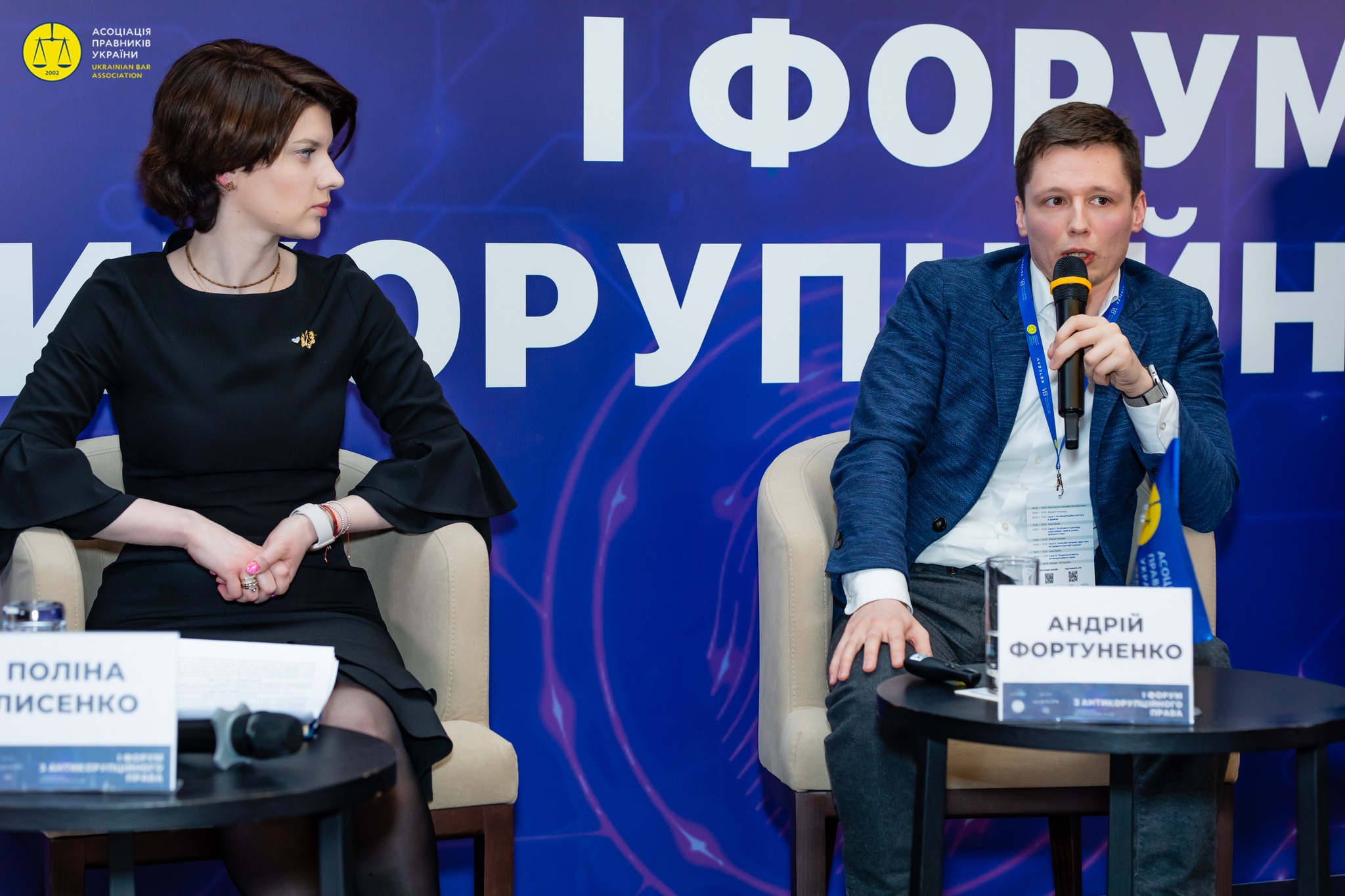
Andriy Fortunenko, Partner, Head of Business Protection Practice at AVELLUM, Member of the UBA Committee on Criminal and Criminal Procedural Law, delivered a report "Trends in the Application of Article 364 of the Criminal Code" (PRESENTATION). Among other things, he touched upon the problem of qualification under Article 364 of the Criminal Code of Ukraine and, accordingly, the distinction between Articles 364 and 191.
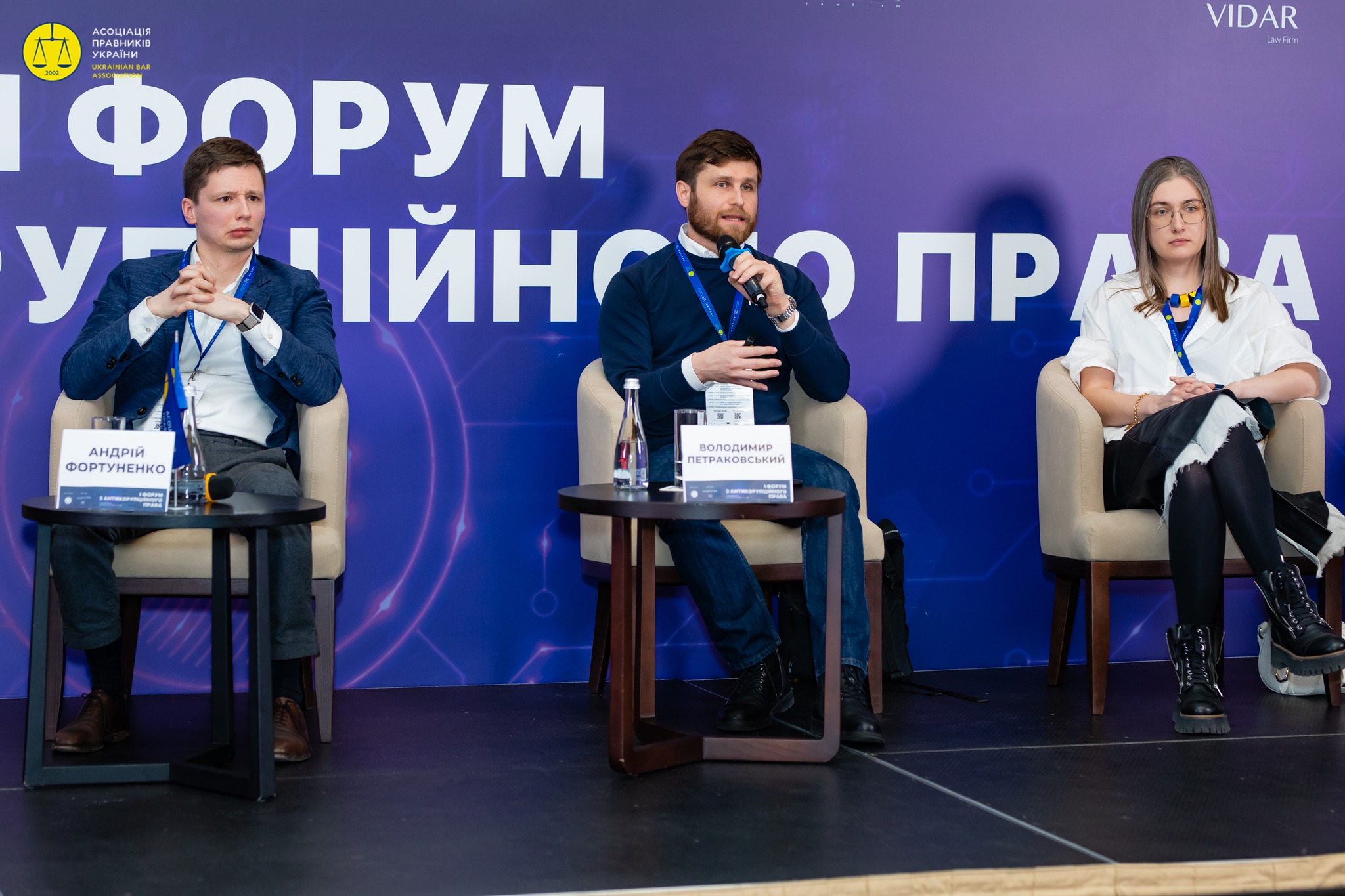
The discussion started by Mr. Fortunenko was continued by Volodymyr Petrakovskyi, Senior Lecturer at the Faculty of Law of the National University of Kyiv-Mohyla Academy, with the topic "Goodbye Local, Hello Regional and Global" (PRESENTATION). The expert, in particular, spoke about the application of the analog of Art. 364 of the Criminal Code of Ukraine in the US court practice and the interpretation of the NSDI by the Court of Justice of the European Union in the case of a Lithuanian prosecutor.
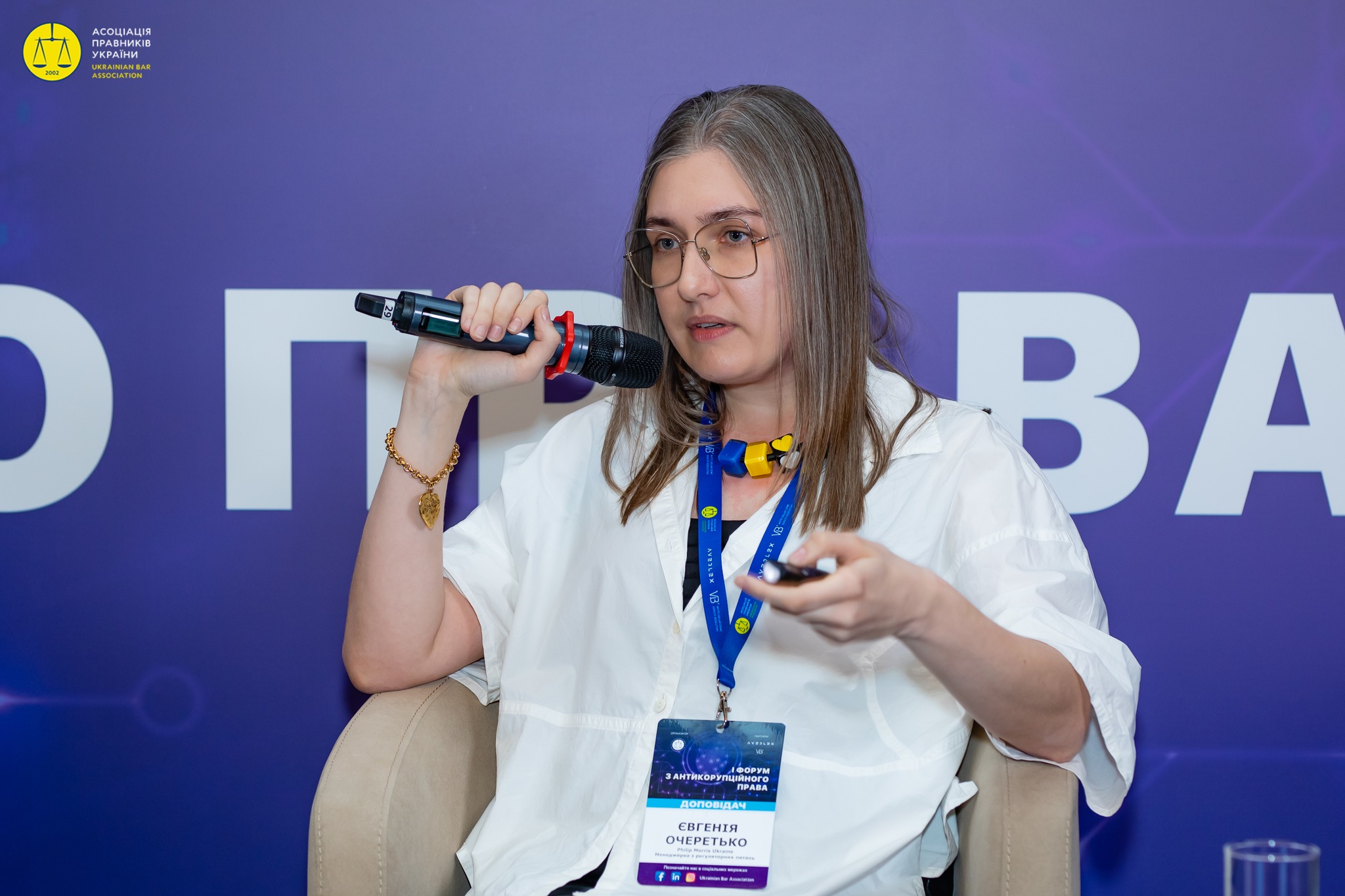
Yevheniia Ocheretko, Regulatory Affairs Manager at Philip Morris Ukraine, presented an overview of whether the recently adopted Law of Ukraine "On Fair Lobbying" will help regulate the lobbying industry in Ukraine (PRESENTATION).
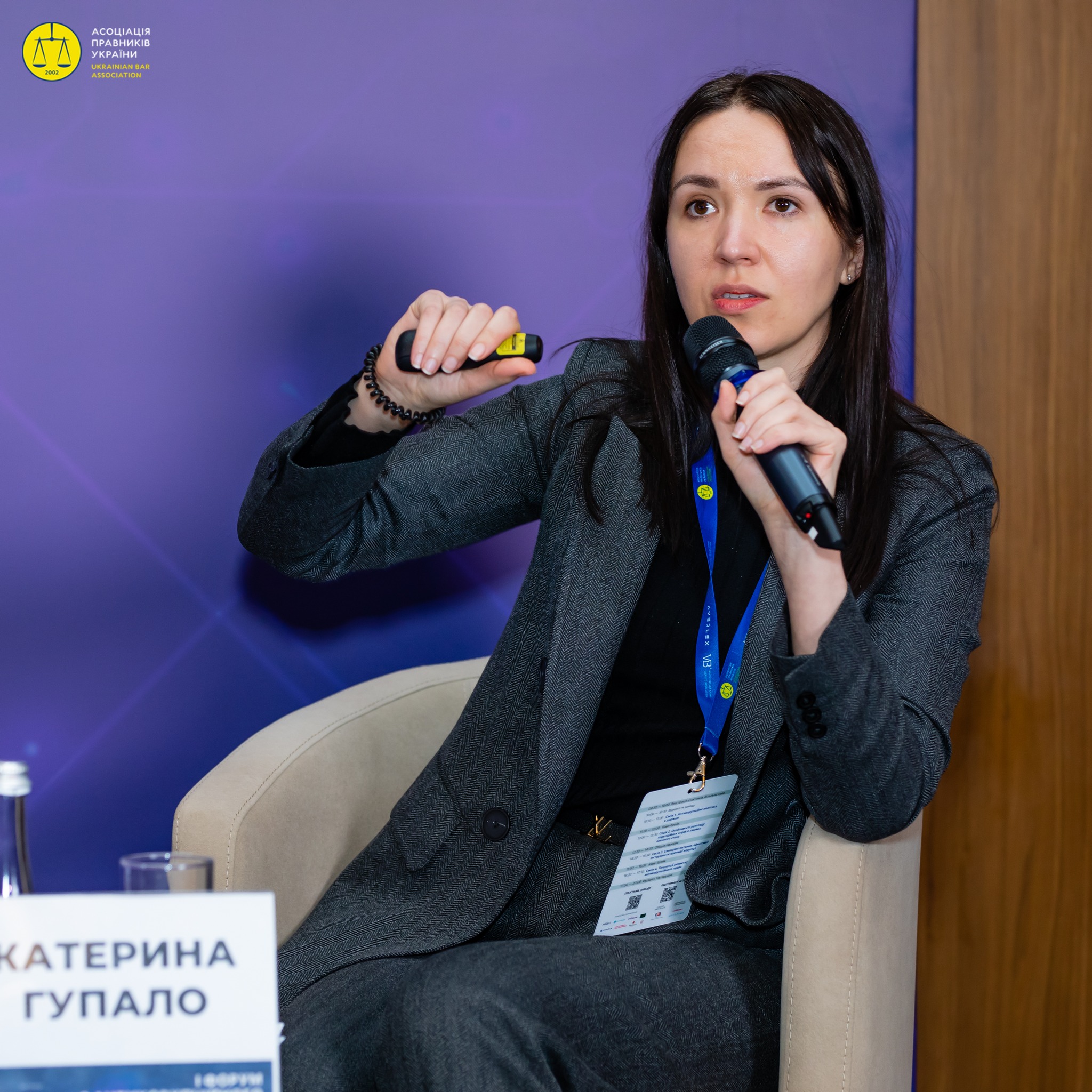
Kateryna Gupalo, Partner at Arzinger, spoke about the nuances of extradition under martial law (PRESENTATION).
More photos from the event can be found at this link.
The Ukrainian Bar Association is grateful for the support in organizing the forum:
Partners of the event:
Sessions partners:
Socially responsible partner
